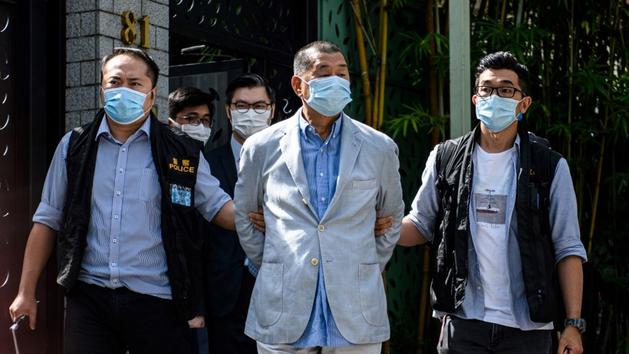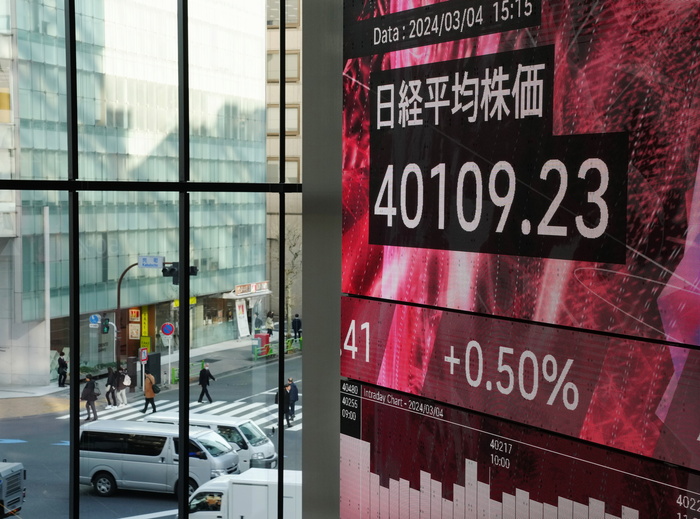François Godement is advisor for Asia at the Montaigne Institute. Former university professor at the National Institute of Oriental Languages and Civilizations then at Sciences Po Paris, the author has notably published, with Abigaël Vasselier, "China at our doors, a strategy for Europe" (Odile Jacob, 2018 ).
François Godement. Fabien Clairefond
FIGAROVOX.- Was the arrest of press boss Jimmy Lai , detractor of Beijing's repressive policy, who was released a few days later surprising?
François GODEMENT.- Yes, because the representatives of Chinese power, including the Hong Kong executive, have made efforts to explain that the “National Security Law” had no consequences for economic circles. However, it was clear from the text of the law that providing assistance or even indirect support to those who commit the "crimes" covered by the law - which, like support for their perpetrators, are defined in the more vague and more extensive - also fell within the scope of the law.
In Hong Kong, many activists or ordinary citizens hastened to erase the traces of their opinions, even past ones.To this the charges add an offense which is a classic, in China, of the repression of support for dissidents or activists, and in particular of law firms: finding an accounting or tax fraud, even minor, as a pretext. In this case, it would be the registration by one of Jimmy Lai's children of a company at the address of press offices whose status does not allow the domiciliation of companies.
Has the repression of "pro-democracy" personalities in Hong Kong intensified since Beijing's promulgation of this so-called "national security" law?
The law is first of all dissuasive - many activists or ordinary citizens have hastened to erase the traces of their opinions, even past ones. It has been speculated that the effective application of the law would be limited: this is false, it now strikes some of the most prominent personalities and the press. Let us note in passing that it is also applied retroactively [which goes against a general principle of criminal law, editor's note] , unlike the assurances also given
The absence of legal guarantees in Hong Kong cannot be confined to political questions, as many foreign investors dream of.What hopes can the defenders of freedoms still hold in Hong Kong? Do they benefit from external support? What are western states doing?
Xi Jinping's message is that no one is immune and that foreign backers will not only fail to protect Democrats, but get them into further trouble under the pretext of colluding with a foreign power. Note that any call for or support for international sanctions also falls within the scope of the law.
Internationally, we are on a fault line. The Hong Kong of the 1997-2047 transition has already lived. The decades that remain before 2047 [date planned for reunification, editor's note] will be those of an economic zone a little more special than the others in China. This could still attract businesses, with two caveats: merciless competition from areas of neighboring Guangdong, and the increasingly obvious lack of legal guarantees. The whole experience of the People's Republic of China indicates that this lack of legal guarantees cannot be confined to political questions, as many foreign investors dream of.
To read also: Extradition law passed by Beijing: "It is the democratic survival of Hong Kong which is at stake"
The attitude of foreign countries is firmer than expected.The attitude of foreign countries is firmer than expected - in large part because of the hardening of American policy, but also because the violation of the 1984 treaty (concluded with the United Kingdom) is a further violation of international law . However, Hong Kong lives on its derogatory legal status: territory separated from China in many respects and in particular customs. Hong Kong is a convenient intermediary station for Chinese capital - for example, investors from Hong Kong in Europe are in principle not treated as investors from the People's Republic of China. All of this can only change.
Xi Jinping is a fan of risk taking.Is this enough to push China back? (let's not talk about the Hong Kong executive, entirely disqualified in the eyes of a majority of the population). Probably not. The desire for full political control takes precedence over all other considerations, and Xi Jinping is adept at risk-taking, expecting international reactions to be either limited, short-lived, or endorsed by a select group of democracies.
Is the “one country, two systems” principle, which theoretically guaranteed Hong Kong people freedoms unknown in the rest of China, dead and buried?
It survives as the regime's slogan, but preceded by "stability", a keyword for the prohibition of democratic debates and henceforth of an elected political representation which "does not reflect the views of the Chinese people" (sic), it is that is to say of the diet. The postponement to one year of the legislative elections - although held according to a formula that works against the democratic parties - shows that Beijing does not want Hong Kong's opinion to be expressed at the polls. The same applies to the bans on candidacy already pronounced. In a year, a lot can happen to complete control - apart from the risk of popular explosions which are responded to with violence.
What China's partners need to understand is that all the beautiful promises made, commitments made at one time or another, are worthless. This is what necessarily undermines the so-called engagement strategies that these partners may wish to pursue in the hope of concessions. The balance of power and interests will decide: in Hong Kong, it is favorable to China.
The political, if not formal, end of the “one country, two systems” principle has consequences for Taiwan. Its fall would be a disaster.Taiwan accuses China of wanting to transform it into "a new Hong Kong" and denounces political pressure from Beijing. How far can Beijing go with regard to Taiwan?
The political, if not formal, end of the “one country, two systems” principle obviously has consequences for Taiwan. Since his accession, Xi Jinping has repeatedly indicated his desire to hasten reunification. Premier Li Keqiang omitted in his oral statement in the May 2020 speech to the National People's Congress the words “peaceful reunification”. Intimidation maneuvers are taking place - face it is true with an American navy which could still reserve some surprises to the People's Liberation Army [official name of the Chinese army, editor's note].
To read also: François Heisbourg: "China is a predator and Europe is its prey"
It is the international community which will also find itself faced with choices here: it has often subscribed to the “one-China policy” (and sometimes, to the “one-China principle” ), but it was with the hope that the status quo will continue, and the impression that this political framework protected in practice against the use of force. Taiwan is not only a model of management in many ways (including still in the fight against Covid) but also one of the most complete democracies in the world. Its fall would be a catastrophe for the future of Chinese culture and society, and a major rout for supporters of the democratic system. The hardening of China will force them to get out of the declarative ambiguity. Of course, it is fraught with risks, but China itself is demonstrating its calculated risk-taking on several simultaneous fronts. In any case, we cannot reduce Taiwan - or Hong Kong for that matter - to their role in Sino-American relations alone.




/cloudfront-eu-central-1.images.arcpublishing.com/prisa/3I74UEXLYRBBRPGPSGWNN6WXH4.jpg)


